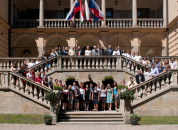
On Monday, 11th July, 2011 inauguration of the jubilee “regular” Visegrad Summer School will be held, involving 50 people chosen as a result of the spring recruitment. The programme of the opening ceremony will be dedicated to the beginning of the Polish Presidency of the EU Council and the 20th anniversary of the Visegrad Group. Maciej Szpunar, Under-Secretary of State in the Ministry of Foreign Affairs, will give the inaugural lecture entitled “Challenge of Presidency.”
After the lecture, already traditional for the Summer School, Ambassadors Debate will begin. This year, it will focus on the operation of the Visegrad Group. The debate will be moderated by Janina Paradowska.
Earlier, we would like to invite Media Representatives for the press conference with the participation of: HE Vasil Grivna, Ambassador of the Slovak Republic to Poland; HE Robert Kiss, Ambassador of Hungary to Poland; Martin Svárovský, Minister Counsellor in the Embassy of the Czech Republic in Poland; Maciej Szpunar, Uder-Secretary of State in the Ministry of Foreign Affairs of Poland; Danuta Glondys, Director of the Villa Decius Association; as well as the coordinators of the project.
Participants of the 10th Visegrad Summer School will come to Villa Decius from Czech Republic, Slovak Republic, Poland and Hungary (in accordance with the rules, 9 people of each country of the Visegrad Group) and also from Romania, Belarus, Kosovo, Macedonia and Ukraine. Among the major themes proposed to participants of the 10th Summer School will be the most current social, political and economic challenges, among them: Polish Presidency of the EU Council, taking into account previous Czech and Hungarian experience; the 20th anniversary of the Visegrad Group, summary and assessment of its functioning, the prospects for the Visegrad cooperation; the EU budget and its consequences for regional development in this part of Europe; the long-term evaluation of social, political, economic and cultural transformations in the region, as well as individual countries; the Eastern Partnership, the region’s energy security; the countries’ involvement in stabilisation missions; cultural diplomacy; demographic changes associated with the new migration phenomena; development of multicultural societies and new waves of extremism in the region; “Europe’s seizure” by the right-wing parties; a new generation of socially engaged intelligentsia; as well as the issues of identity and cultural identity, role and place of media in the modern world, modern culture of Poland and neighbouring countries.
Coordinator :
Anna Kowalska – ania@villa.org.pl
Jadwiga Figiel-Stoch – jaga@villa.org.pl




